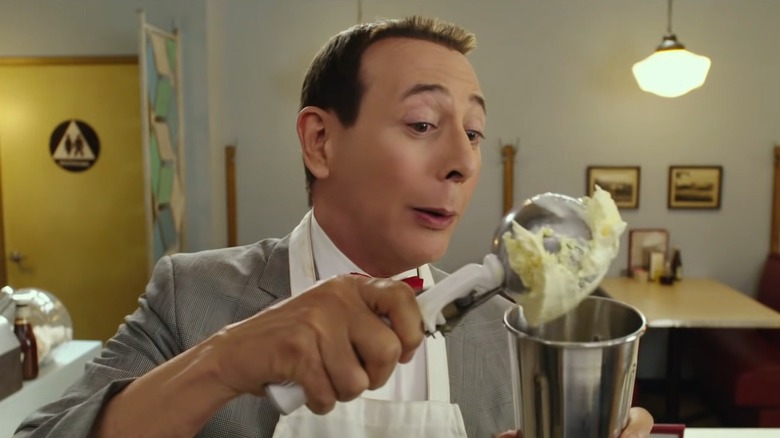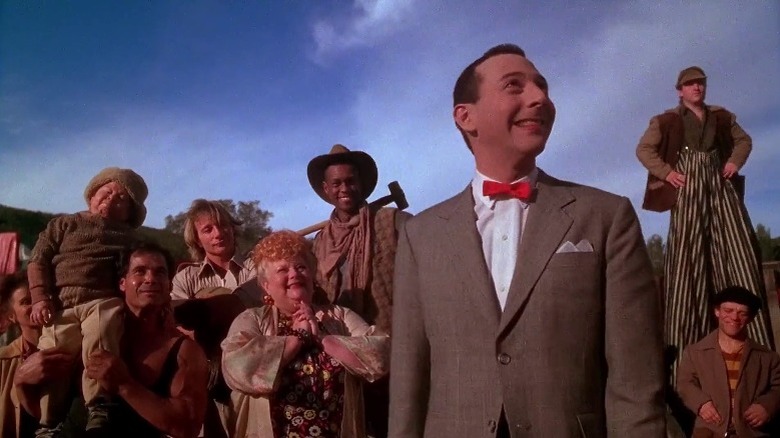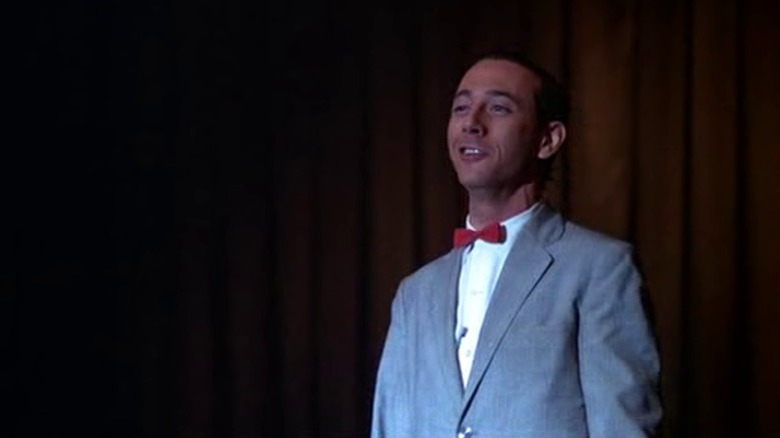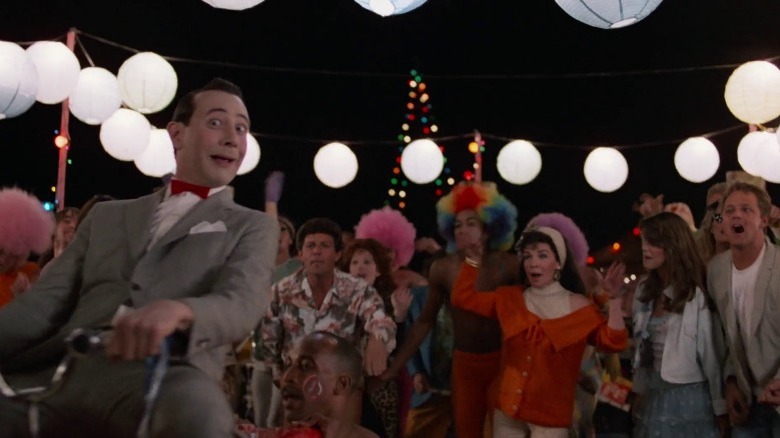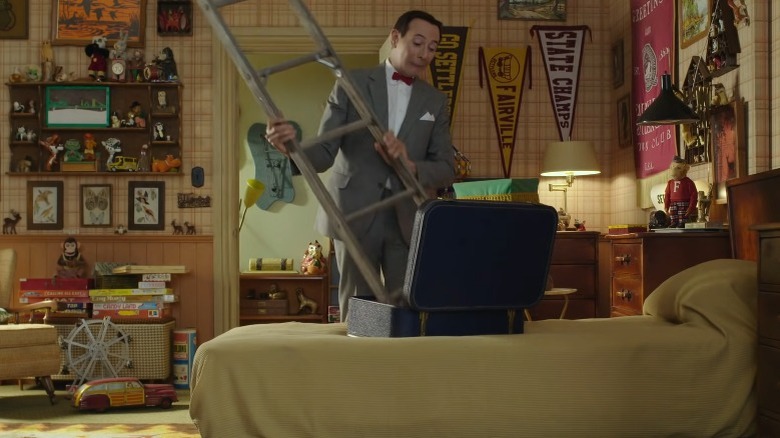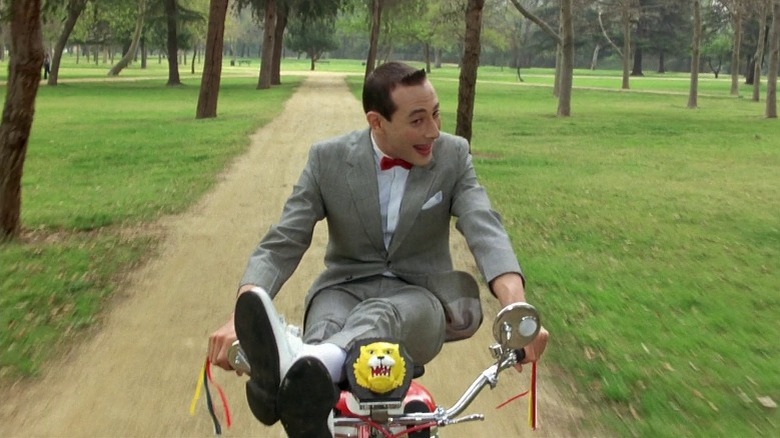Every Pee-Wee Herman Movie Ranked Worst To Best
Paul Reubens died on Sunday, July 30, at the age of 70, and his contribution to the world of film and television as an actor, comedian, writer, and host cannot be overstated. In addition to being one of the most idiosyncratic, most reliably hilarious comedic performers of his generation in roles ranging from a flamboyant vampire in "Buffy the Vampire Slayer" to a snobby waiter in "The Blues Brothers" to a talking raccoon in "Dr. Dolittle," he also had an underrated knack for dramatic acting, as demonstrated in films like "Blow" and TV series like "The Blacklist" and "Mosaic."
Therefore, the fact that Reubens is still so widely remembered as the star behind Pee-wee Herman is not a slight on the rest of his sturdy resume, but a testament to just what a legendary character Pee-wee was. A giddy, eccentric, hyperactive manchild with a life entirely made up of whimsical adventure and baffling absurdity, Pee-wee Herman started as a stage act parodying incompetent stand-up comics before crossing over to the films, TV series, and specials that made him a pop culture icon. During Reubens' 40-year-plus tenure as the character, he brought his most famous creation to a total of five feature films, including three Pee-wee-centric installments and two significant supporting appearances in 1980s comedies.
Naturally, each of those Pee-wee cinematic ventures is memorable in its own way, so let the following ranking be first and foremost a celebration of the character's massive imprint on American cinema.
5. Big Top Pee-wee
Written by Paul Reubens and George McGrath and directed by Randall Kleiser (also known as the director of such beloved '70s/'80s films as "Grease" and "The Blue Lagoon"), 1988's "Big Top Pee-wee" is the second of the three films officially existing as part of the Pee-wee Herman film "franchise." Narratively, it functions as a standalone sequel to 1985's "Pee-wee's Big Adventure," bringing back the character himself and the central ethos of unbridled mayhem while essentially eschewing all of the original film's plot in favor of a brand-new story. This time, Pee-wee is a farmer with dreams of musical stardom, whose quiet daily life tending to his various animals and crops and spending time with his fiancée Winnie Johnson (Penelope Ann Miller) is interrupted when a storm brings an entire circus to his front yard.
"Big Top Pee-wee" is not as well-remembered as "Pee-wee's Big Adventure" despite the temporal proximity between both films, and there's a reason why. Although Reubens is in top form as always, the film does not display the same level of sustained creativity as the finest Pee-wee outings, nor does it successfully strike the same tricky tonal balance. The circus plot is somewhat sophomoric, the zest and innocence that usually defined Pee-wee as a character are punctured by sexually charged humor that doesn't land enough to truly justify itself, and a love triangle subplot mostly just makes Pee-wee come off as an annoying jerk. The animals are all very charismatic, though.
4. Cheech and Chong's Next Movie
Back when Paul Reubens was trying out the character of Pee-wee Herman as a member of the famed improv group The Groundlings, the key concept behind the character was that he was a really bad stand-up comedian. It was this idea that informed Pee-wee's second onscreen appearance, following a debut stint on "The Dating Game," and arguably the first to help him break out significantly into the mainstream: A supporting turn in 1980's "Cheech and Chong's Next Movie."
The second of various feature film vehicles starring the American comedic duo of Cheech Marin and Tommy Chong, "Cheech and Chong's Next Movie" stays true to their brand, presenting a series of loosely-connected stoner misadventures with a plot that mostly serves as an excuse to keep them moving from setup to setup. In one of their run-ins with baffled side characters, Cheech & Chong provoke the ire of an uptight hotel receptionist — who turns out to be Pee-wee Herman working a day job. Later in the film, they aggravate Pee-wee again by heckling him as he's presenting his act at a comedy club, and it's during the ensuing altercation that the Pee-wee persona we now know and love finally begins to shine through.
Although its stoner humor has aged somewhat since 1980, the film itself is one of the better, most consistently entertaining Cheech & Chong features — not a patch on the very best Pee-wee films, but still a worthy big-screen introduction to the character.
3. Back to the Beach
The great thing about Pee-wee Herman was that he was intrinsically so absurd and out-there as a comic figure that there weren't many contexts in which an appearance by him wouldn't make sense. Not only did the films specifically about Pee-wee liberally jump from setting to setting and from continuity to continuity, but his appearances in other media also abided by the same anything-goes, sans-backstory spirit. As an example, look no further than his delightful contribution to 1987's "Back to the Beach."
A loving parody-slash-homage to the beach party films of the 60s, which courted teenage audiences with effervescent, guilt-free, music-filled, scantily-clad fun at a time when that was enough to raise a social ruckus, "Back to the Beach" stars two of the genre's luminaries, Frankie Avalon and Annette Funicello, now playing their old beach-loving personas as a middle-aged married couple living a calm life in Ohio. Thanks to a family trip to Hawaii gone wrong, Frankie and Annette find themselves stuck in California with their son Bobby (Demian Slade) and daughter Sandi (Lori Loughlin), and soon get back in contact with their old surfing scene. The film, directed by pioneering Australian filmmaker Lyndall Hobbs and featuring more 80s celebrity cameos than you could count, is basically all earnest fun, all the time — and is perfectly complemented by Paul Reubens' appearance as Pee-wee, who shows up out of the blue to sing a spirited, note-perfect rendition of "Surfin' Bird" before flying away into the night on a floating surfboard.
2. Pee-wee's Big Holiday
Pee-wee Herman took a hiatus of nearly 30 years from feature films after "Big Top Pee-wee" before making his return to the big screen — but only for a lucky minority of viewers. In what ultimately went down as one of the first major forays into original film distribution by Netflix, Paul Reubens co-wrote and starred in "Pee-wee's Big Holiday" for the streamer in 2016. The film premiered at South by Southwest and had a limited theatrical run at Alamo Drafthouse, but otherwise, Reubens' final work as Pee-wee was an at-home viewing experience for the majority of the public — which turned out to thoroughly befit the project in question. A more modest, less wildly ambitious effort than "Pee-wee's Big Adventure" and "Pee-wee's Playhouse," "Pee-wee's Holiday" nonetheless retained the earlier films' charm and personality while playing expertly to nostalgia.
The plot follows Pee-wee as he leaves his small town of Fairville — allegedly "for the first time in his life," in a classic instance of the franchise's continuity-free cartoon logic — to embark on a trip to New York City that turns out to be a lot less linear than expected. With help from guests like Alia Shawkat, Stephanie Beatriz, and Joe Manganiello (as himself), Reubens and director John Lee construct a charming farcical adventure that carries all the hallmarks of a classic, satisfying old time with Pee-wee Herman — and even sneaks in enough sincere emotion to stand as a fitting send-off to the character and his singular, ever-changing world.
1. Pee-wee's Big Adventure
"Pee-wee's Big Adventure" isn't just the best Pee-wee Herman film; it's one of the very best American films of the '80s, full stop, and a shining example of what Tim Burton was capable of in his early, energetic prime as a filmmaker. Written by Paul Reubens alongside Phil Hartman and Michael Varhol, and taking inspiration from the 1948 Italian neorealist classic "Bicycle Thieves," Burton's feature directorial debut takes the simplest of narrative starting points — Pee-wee Herman has his bicycle stolen, and embarks on a desperate nationwide search for it — and turns it into one of the most raucous, inventive, surprising, and relentlessly hilarious comedies ever made.
Almost all of the unique, inimitable greatness we now associate with Pee-wee's screen appearances was born here, from the surreal abandon of the storytelling to the ingenuity of the comedic set pieces to the consistent strength and maximalist flair of the gags. As if all that weren't enough, it's the perfectly-designed cinematic vehicle to showcase all of Reubens' je ne sais quoi as a performer — the way that he committed to each pratfall and each line delivery so thoroughly, and with such indefatigable attention to character and tone that any five-second stretch of the film could be its own comedy masterclass in miniature. That he did it while making it all look so easy, and projecting such an electric, contagious, life-affirming sense of joy and generosity along with the film's similarly brilliant ensemble, is enough to demonstrate why he'll always be remembered as a legend.
